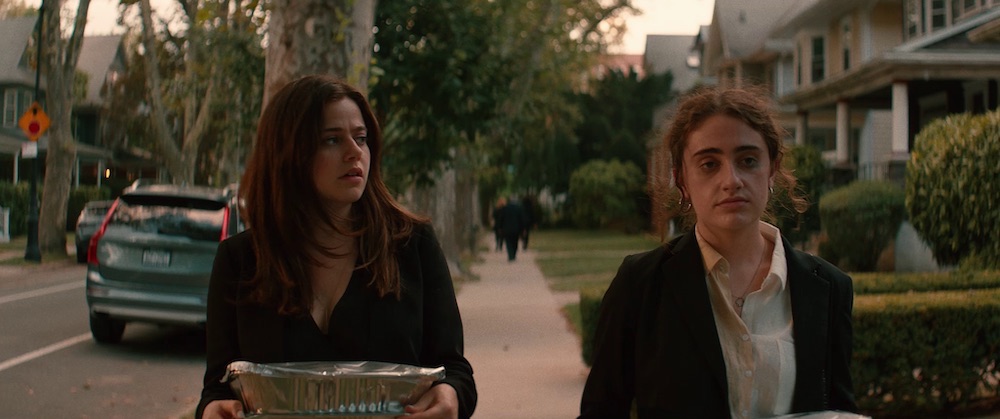Comedian Rachel Sennott stars as Danielle, a conflicted, bisexual twenty-something college student who's taking money she doesn't really need from a sugar daddy who isn't who she thinks he is. Emma Seligman’s debut feature, which began as a short in her film studies degree at New York University, is full of energy in its exploration of the dynamics of sex, power and career, with lox and bagels on the side.
At the shiva (a Jewish mourning event featuring, in this case, a large buffet and poisonous gossip) Dani is plunged into a maelstrom of nosy, judgmental relatives and parental friends, all of them obsessing about her weight loss – “She used to be kind of chubby,” says her well-meaning father (a brilliant Fred Melamed) - and her career. As if that's not enough, the sugar daddy she had sex with that morning in his SoHo apartment turns up at the shiva with his wife and baby.
Why isn’t she at grad school or law school, wonders the chorus of busybodies. What is this vague, made-up gender studies major she mentions? How is a feminist lens going to lead to making money? And why doesn’t she have a boyfriend when she can surely find someone – a doctor or lawyer, preferably - on Jdate and JSwipe?
Sometimes this New York Jewish family hysteria may seem in danger of verging on caricature but Seligman’s tone is so original and exuberant that you’re carried along on the anxiety-ridden roller-coaster, and Sennott conveys Dani’s inner life, and her juggling of different personas, with great intelligence. She’s prone to mischievously black asides (as well as compulsive lying). Admiring some travel photos on an old lady’s phone, she murmurs, “You guys are at the Holocaust Museum! You look so happy!”
 Danielle is using a Sugar app (all the rage at NYU, apparently, when a young student needs financial assistance from a wealthy older person), which is how she met Max (Danny Deferrari), a handsome, bearded young man with an entrepreneurial “shiksa princess” wife, Kim (Dianna Agron; Glee, pictured above with Danny Deferrari as Max), who can’t pronounce rugelach. “She has three businesses but you can’t tell because she’s so chill,” enthuses Dani’s childhood friend Maya (Molly Gordon). “Why three?” asks Dani bitterly. “Did they all fail?”
Danielle is using a Sugar app (all the rage at NYU, apparently, when a young student needs financial assistance from a wealthy older person), which is how she met Max (Danny Deferrari), a handsome, bearded young man with an entrepreneurial “shiksa princess” wife, Kim (Dianna Agron; Glee, pictured above with Danny Deferrari as Max), who can’t pronounce rugelach. “She has three businesses but you can’t tell because she’s so chill,” enthuses Dani’s childhood friend Maya (Molly Gordon). “Why three?” asks Dani bitterly. “Did they all fail?”
At his apartment that morning Max slips Dani (looking older and smoother than she does at the shiva) a wodge of notes (she has to remind him to pay up) and fastens a bracelet on to her wrist, saying how happy he is to support her in her law-school studies. That bracelet that will come to haunt them both.
But as the claustrophobic shiva progresses, Dani’s mother (the wonderful Polly Draper), who barks insults at her genial husband - “You have a farkakta memory. You’ve got Alzheimer’s” - becomes concerned about her daughter’s odd demeanour. How do Dani and Max know each other, she wonders? Their stories about meeting at shul or temple don’t add up. Especially as Dani never sets foot in either. And she’s worried about Dani’s “experimenting” with Maya.
Maya and Dani’s relationship is complicated. At first their antagonism is unexplained, then you realise they were lovers. They went to the high school prom together, Maya, who really is at law school, explains to a puzzled Max. But they have drifted apart, perhaps because of Dani’s preoccupation with sugar sites, which Maya, the most self-aware and in-control character in the film (Molly Gordon, pictured below, left, with Danielle), knows nothing about until she glimpses Dani’s phone.
 And why is Dani using these apps? Her parents, as they remind her benignly and humiliatingly, pay her rent and bills and have put her on their pay-roll. Max, understandably, looks increasingly confused as he hears these revelations. Perhaps, as she eventually explains to Maya, it’s a question of power. And with parents like hers, who can blame her? Their smothering and infantilising, albeit loving - and of course she lets herself be infantilised - is almost Portnoy-esque (and as Portnoy put it, “My wang was all I really had to call my own”).
And why is Dani using these apps? Her parents, as they remind her benignly and humiliatingly, pay her rent and bills and have put her on their pay-roll. Max, understandably, looks increasingly confused as he hears these revelations. Perhaps, as she eventually explains to Maya, it’s a question of power. And with parents like hers, who can blame her? Their smothering and infantilising, albeit loving - and of course she lets herself be infantilised - is almost Portnoy-esque (and as Portnoy put it, “My wang was all I really had to call my own”).
Power is the crucial factor in Max’s behaviour too. Like Dani, he is playing a role, that of the well-heeled businessman, when in fact his wife is the breadwinner. Reality, in the form of savvy, suave Kim forcing her to hold their crying baby, shocks Dani into a tearful epiphany, breaking glass and dropping prayer-books as she goes. It’s her tender relationship with Maya that looks set to save her, though the film’s ending feels a little unfinished. But then, Danielle herself is unfinished, and you want to know where life will take her next.
- Shiva Baby is in cinemas from 9 June and on Mubi from 11 June
- More film reviews on theartsdesk















Add comment